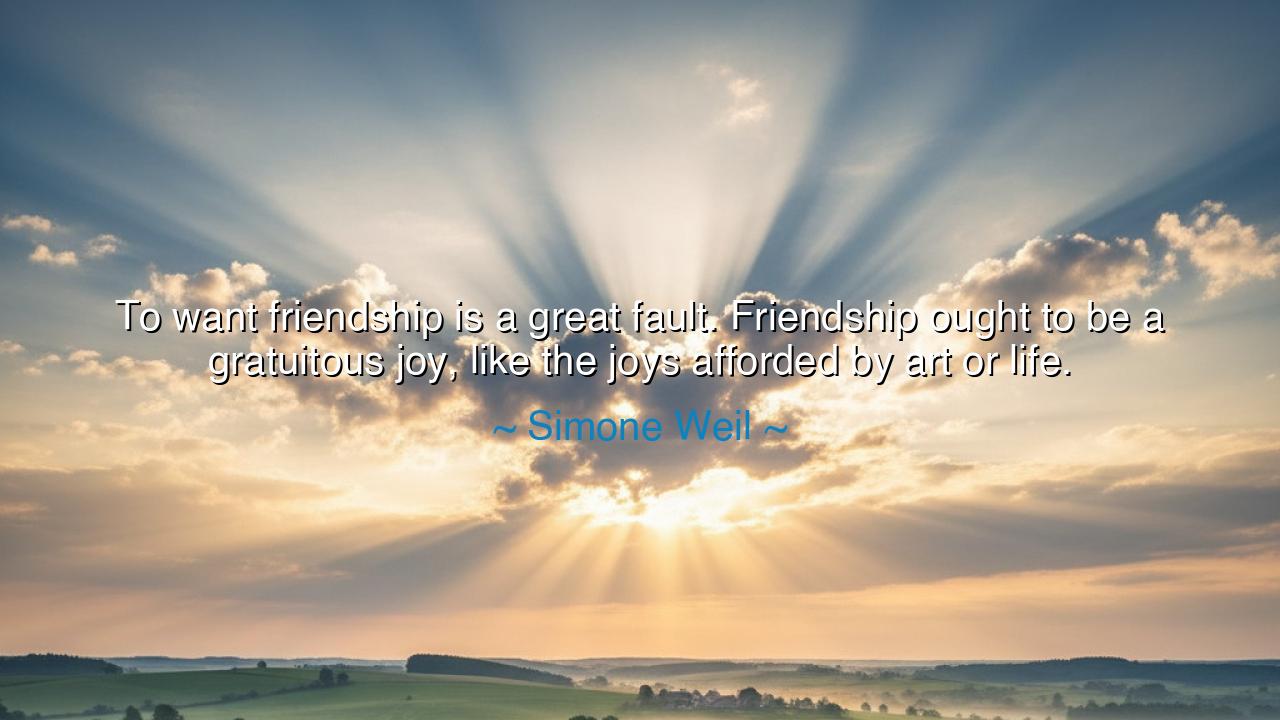
To want friendship is a great fault. Friendship ought to be a
To want friendship is a great fault. Friendship ought to be a gratuitous joy, like the joys afforded by art or life.






Hearken, O seekers of wisdom, to the profound reflection of Simone Weil, whose insight illuminates the nature of human connection: “To want friendship is a great fault. Friendship ought to be a gratuitous joy, like the joys afforded by art or life.” In these words lies a subtle yet piercing truth: friendship is not a possession to be demanded, nor a commodity to be earned, but a gift freely offered and received, a spontaneous delight that enriches the soul without obligation or expectation.
The origin of this insight lies in Weil’s philosophical meditations on human desire and virtue. She observed that the heart that clings to friendship as a goal or entitlement risks corruption, for it measures the value of another by its own need. True friendship, like beauty in art or the simple pleasures of life, is experienced in its own right, unbound by calculation or demand. To seek it obsessively is to distort its purity; to receive it freely is to taste its transcendent joy.
Consider the friendship of Ralph Waldo Emerson and Henry David Thoreau, whose companionship was marked not by entitlement but by shared delight in thought, observation, and presence. Their friendship was not demanded, but flowed naturally from mutual respect, curiosity, and delight in each other’s company. They understood that the greatest joy in friendship arises not from ownership, but from appreciation and shared experience. In this, we see the living truth of Weil’s teaching: friendship is a gratuitous gift, a joy in itself, not a reward for effort or a remedy for need.
The essence of this teaching is that love of friendship must be free from the tyranny of desire. To demand friendship, to seek it as an obligation fulfilled, is to undermine its spontaneity and its depth. True friendship thrives when hearts meet freely, when joy is given and received without expectation, and when the companionship of another is celebrated as a grace, not a right. Like the pleasure of a painting, a melody, or a sunrise, it is most precious when it cannot be commanded.
Even in history, this principle is reflected in the bonds of exiled or solitary figures. The friendship of Michel de Montaigne and Étienne de La Boétie was profound and voluntary, arising not from duty or obligation, but from a shared spirit and delight in one another’s company. Montaigne’s essays reflect the joy of their companionship, a union of minds and hearts freely chosen, reminding us that the most enduring friendships are those that arise as a blessing, not a demand.
Weil’s insight also speaks to the moral dimension of human desire. To cling to friendship as a remedy for loneliness or a tool for advantage risks transforming it into dependency or exploitation. The heart that values friendship as a gratuitous joy cultivates patience, gratitude, and reverence, and is capable of receiving the gift with humility and delight. This is the wisdom of the ancients: virtue and joy are most fully realized when offered and received freely, without measure or expectation.
Practical guidance flows naturally from this teaching: treasure the friends who enter your life without compulsion, appreciate the joy of their presence, and cultivate companionship through generosity rather than demand. Seek to enrich the lives of others freely, without expectation, and allow friendships to flourish naturally, like art admired for its beauty rather than its utility. In this way, your bonds remain vibrant, joyous, and enduring.
Thus, remember the teaching of Simone Weil: friendship is not to be sought as a possession, but cherished as a gratuitous joy, a delight to the soul akin to the pleasures of art, nature, or life itself. Approach it with humility, gratitude, and reverence, and you shall know the true depth of human connection, a joy that transcends need and blossoms in the freedom of hearts united by mutual delight.
If you wish, I can also craft a short, lyrical version for audio narration, emphasizing the emotional resonance and philosophical depth of Weil’s vision of friendship as a gratuitous joy. Do you want me to do that?






AAdministratorAdministrator
Welcome, honored guests. Please leave a comment, we will respond soon